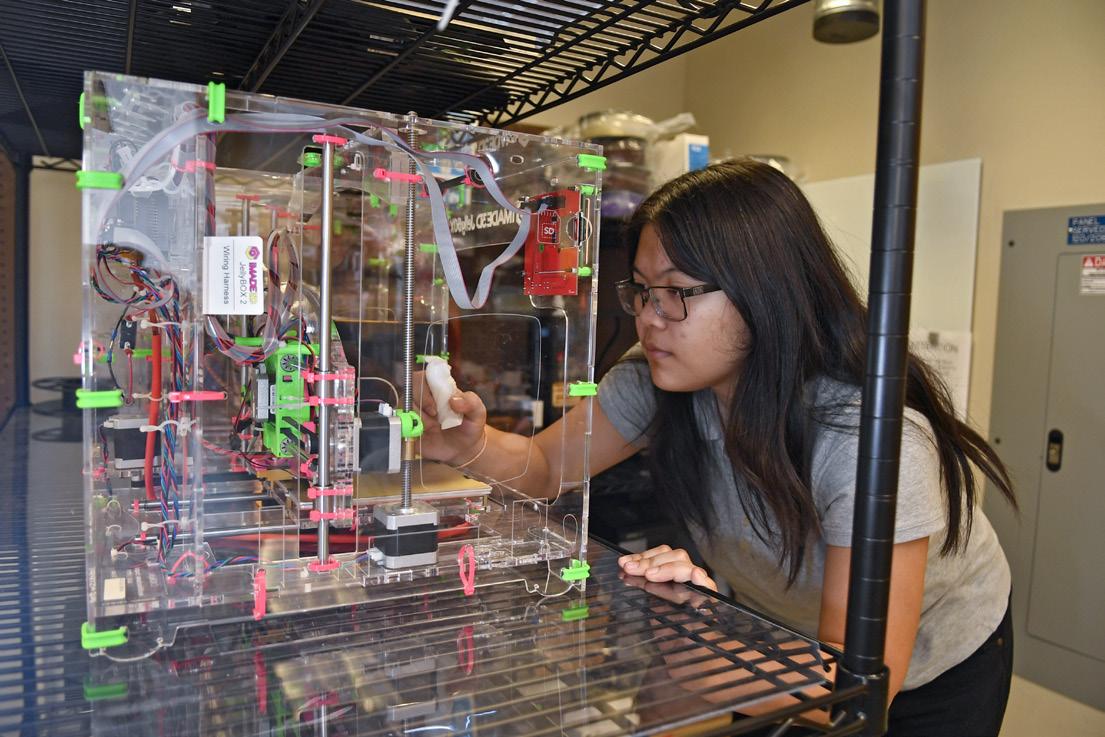
21 minute read
A Computing Revolution: CCI at 20
Data Science
In January 2020, in collaboration with UNC Charlotte’s College of Liberal Arts and Sciences, College of Health and Human Services and the William States Lee College of Engineering, CCI co-launched the School of Data Science (SDS), the first in the Carolinas. SDS will tap into the region’s research, industry and community engagement expertise to revolutionize the education and application of data science. See page 11.
Kat Lawrence
A COMPUTING REVOLUTION: CCI at 20
BY MIKE FRESINA
In 2000, UNC Charlotte established the College of Computing and Informatics (CCI) to address and get ahead of the dynamic needs being created by the everincreasing presence—and dominance—of technology, not only in higher education but in the everyday sightlines of those working in the business, government and nonprofit worlds.
Spun from the William States Lee College of Engineering, CCI opened its doors with an initial enrollment of approximately 700 students. Today, with 2,320 undergraduate and 900 graduate students, CCI is the fastest-growing college in the UNC System—and delivers the largest computer science program in North Carolina.
“In its first 20 years, CCI distinguished itself through its agility, responsiveness to the times and willingness to be bold and experimental,” said Fatma Mili, CCI’s dean. “Our founders made a strategic bet and it paid off.”
Now an established leader in high-tech education, CCI operates three departments that offer bachelor’s, master’s and doctoral programs: Bioinformatics and Genomics (BiG), Computer Science (CS) and Software and Information Systems (SIS). Through its programs, CCI expresses its longstanding commitment to access, equity and inclusivity, principles responsible for shaping the college’s time-earned reputation as:
• An emerging research powerhouse. Averaging more than $10 million annually in research funding, which accounts for 20 percent of total UNC Charlotte research funding, CCI’s grants come from a variety of sources, most notably the National Science Foundation, National Institutes of Health and Department of Defense.
• A notable producer of high-quality workforce talent. With approximately 70 percent of CCI graduates—consistent with UNC Charlotte’s entire alumni base—living and working in the region, the number of qualified high tech CCI leaders across the Piedmont and beyond grows in concert with the College’s enrollment.
• A cultivator of diverse students and graduates. Currently, CCI ranks first in North Carolina for female and Hispanic computer science graduates, and second for African American graduates. Equally important are more than 500 first-generation college graduates in its alumni base.
Mili, who was named CCI’s dean in 2017, acknowledges the values on which the college was founded, and the leadership of her predecessors. Founding dean Mirsad Hadzikadic remains a member of the CCI faculty, even after a 2018 run for the presidency of his native Bosnia-Herzegovina. He was followed by Yi Deng, now dean of Drexel University’s College of Computing and Informatics.
“The next two decades will be drastically different in what we teach, the research we produce, and how we are organized,” said Mili. “But not in who we are. Qualities intrinsic to the program: foresight, courage in action, and fearlessness in caring will always characterize CCI.”
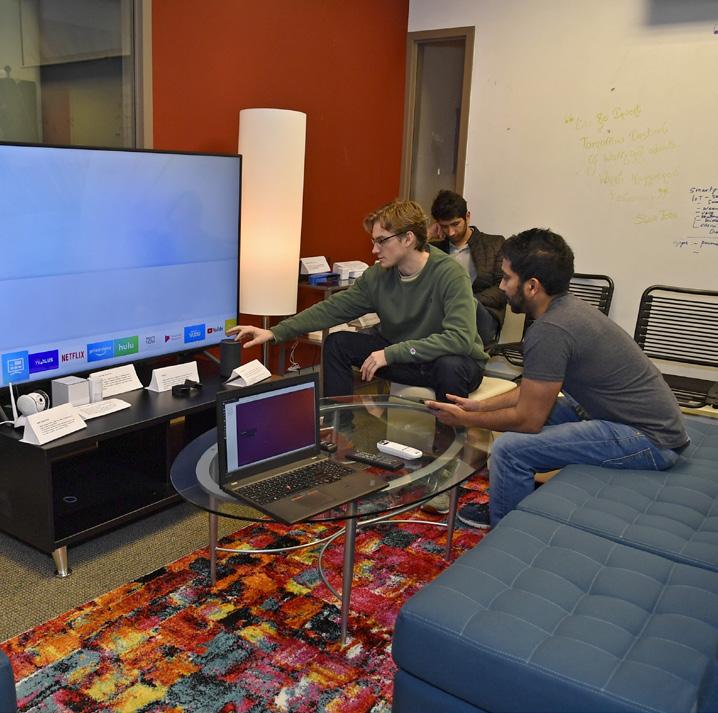
Guiding Force: CCI’s Mission and Values
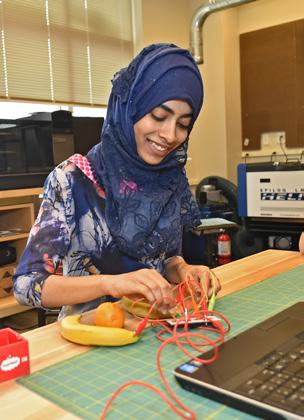
The College of Computing and Informatics mission and values have set its standards for planning and goal setting since its founding in 2000:
We are committed to the betterment of society. We accomplish this through:
•Cultivating an inclusive culture dedicated to student success and equity in education
•Stimulating innovative highrisk, high-impact research and development
•Maintaining a resilient and ethical society of educated, caring citizens
We are driven by our guiding values:
•Acknowledge inequity and do everything in our power to address it
•Take responsibility for the ethical implications of technology in everything we do
•Value community and the wellbeing and sense of worth of all members
BiG: CCI’s Little Giant
By traditional metrics, the Department of Bioinformatics and Genomics (BiG) in the College of Computing and Informatics (CCI) is among UNC Charlotte’s smallest departments. Despite is size, it’s influence and impact are notable— and noticeable. Offering doctoral and master’s degrees as well as certificate and undergraduate minors and concentrations, BiG graduates fewer than 20 students each year. Even so, it has generated more than $16 million in research grants since 2015 and is consistently ranked among the nation’s top programs.
The launch of CCI’s Bioinformatics program coincided with the 2000 wrap-up of the $3 billion Human Genome Project, a multiyear, international scientific research effort that set out to determine the base pairs that make up human DNA, and identify and map all the genes of the human genome from both a physical and a functional standpoint. The project signaled the beginning of a new quantitative era of biology, in which mathematics, statistics and high-performance computing would become essential tools for solving important problems in the life sciences.
Bioinformatics at UNC Charlotte began in 2004 with a day-long workshop of stakeholders. Shortly thereafter, then-Chancellor James H. Woodward obtained $35 million from the North Carolina legislature for the Bioinformatics Building, which was completed in 2009. At that point, enough faculty had been recruited to form the Department of Bioinformatics and Genomics within CCI.

Tackling computational microbial genomics
BiG’s newest initiative is in computational microbial genomics, which aims to apply computational analysis to help scientists better understand how the millions of microbes humans encounter interact with us and the environment. Some of these microbes, most of which are completely unknown to science, are critical for our existence, helping plants grow, regulating the carbon cycle, aiding food digestion in people and animals, and other beneficial functions such as eliminating waste from ecosystems.
“A deeper understanding of our microbial neighbors through molecular sequencing and bioinformatics is increasing our understanding of personal, public and ecosystem health,” said Dan Janies, Carol Grotnes Belk Distinguished Professor of Bioinformatics and Genomics. “With bioinformatics computing we are seeing new connections between these fields, for example in diseases emerging from animals to humans. Identification of the sources of new disease are among the first steps to stopping outbreaks and future emergence.”
Cybersecurity Forerunner CCI’s annual cybersecurity conference is regarded as an industry staple. 2019 marked its 20th year.
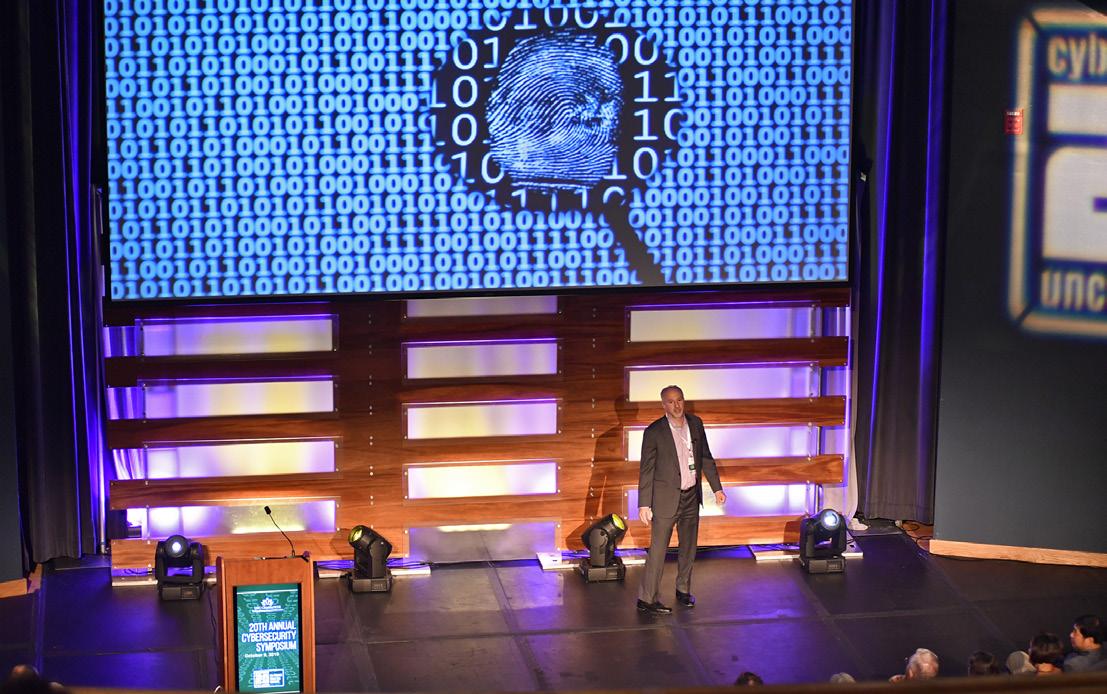
Kat Lawrence
Two decades ago—before “cybersecurity” had entered the public lexicon—UNC Charlotte leaders who established the College of Computing and Informatics had the foresight to embrace information security as an academic concentration.
“CCI now has more than 300 cybersecurity majors,” said Bill Chu, professor of software and information systems, one of the program’s founders. “That is beyond my wildest imagination, even as recently as a couple of years ago; I am extremely grateful for the people who helped us envision and launch this thing.”
Started by a small group of industry and academia representatives in a classroom at the Mint Museum of Craft and Design, CCI’s Cybersecurity program has grown to become regarded as one of the UNC Charlotte’s most influential academic concentrations.
“Back in 2000, when we talked about security, we were referencing viruses such as Slammer, Code Red and Nimda, thinking it was the worst thing that could happen,” said Tom Bartolomeo, head of cybersecurity and defense for Wells Fargo, who has been affiliated with CCI since its inception. “Here we are, 20 years later, battling nation states, cyber criminals and sophisticated denial-of-service attacks. We need the private and public sectors to come together with academia in a collaborative effort not only to develop the best technology, but also the brightest minds. That is the strength of CCI’s cybersecurity program.”
Cultivation of cybersecurity talent, in addition to conducting cutting-edge research, is allowing CCI to meet the workforce needs of a rapidly growing industry. According to the U.S. Department of Labor, job growth in cybersecurity is expected to exceed 30 percent in the next decade, more vigorous than the average in almost every other industry. According to Cybercrime magazine (Oct. 2019), North Carolina is one of the top five U.S. states for cybersecurity jobs. With demand high— currently more than 300,000 related jobs nationwide are unfilled—median salaries are expected to exceed $100,000 by 2021.
Marking its 20th anniversary alongside CCI is the college’s annual cybersecurity symposium. Held each October on campus, the symposium is the region’s top conference of its kind. Always sold out, it draws more than 600 cybersecurity professionals and students from around the globe to discuss threats and mitigation techniques with highly sought after speakers and information-rich breakout sessions. In addition, it serves as a recruiting event that provides students access to—and opportunity to interact with— professionals in the field.
“It is not a tradeshow, which is one of the most interesting things about the symposium,” said Matthew Snyder, chief technologist for Booz Allen Hamilton. “[At UNC Charlotte] we are interacting with the next generation of security professionals, which is exceedingly valuable to help us grow and keep our eye on the ball.”
‘Gaming’ the System: Evie Powell pushes boundaries responsibly I f doing something one loves means never working a single day, Evie Powell ‘07, ‘09,
‘12, is well on her way to a “work-free” life. Powell, whose three degrees are from UNC Charlotte’s College of Computing and Informatics (CCI), has taken a passion for video games and cultivated a uniquely creative and successful career.
“Like most kids, I played puzzle, combat and shooter games,” explained the Charlotte native and Olympic High School graduate. “To me, game developers were like NBA AllStars to a kid who plays basketball. They were the heroes of my hobby.”
By 2012—still shy of her 30th birthday— Powell had earned a bachelor’s and a master’s degree in computer science as well as a doctorate in computing and information systems. She set off for Seattle to accept a job as a virtual reality engineer for Proprio, a computational imaging company that provides enhanced visualization systems for brain surgery and other precision tasks.
While working full time providing surgeons with medical imaging during live surgery, Powell launched Verge of Brilliance (VoB), an experimental games studio from a shared innovation hub at the University of Washington.
“The goal is to push the boundaries of what we expect from game play,” she explained. “At Verge, we try for meaning deeper than pure entertainment.”
Focused on atypical game designs, VoB is exploring pervasive design and context-aware gaming—and their challenges, including players’ ability to virtually experience the game they’re playing in a lifelike environment in real time. Powell believes pervasive game play is a viable means to learning about the implications of ubiquitous computing.
“For someone to engage in a game with no boundaries, a designer has to think critically about when and where a person could be playing. A rooftop? A busy street? Considerations have to be made for what else they could be doing as they engage, and the level of attention required. To not do so would make the game socially unacceptable at best; outright dangerous at worst.”
At VoB, Powell is free to focus on ethical and socially responsible game design, a concept woven through CCI’s curriculum. In fact, ethical computing is something that

Fatma Mili, CCI’s dean, makes central to the college’s overall culture.
“For 20 years, CCI has cherished the curiosity of its students,” Mili said. “Our faculty and staff work with them to further cultivating this curiosity so it can become their most important professional and social asset. By refining their curiosity, focusing it and honing it on what matters, on who matters, they emerge responsible, as caring professionals and citizens who see opportunities, care about their world, and act on it.”
“This notion is beginning to take hold in the industry,” said Powell. “Mass-market do-over games, especially when they’re re-released only to push enhanced graphics or faster speeds, but lack meaningful content, are discouraged. For me, personally, it’s important to pay attention to how female characters are presented.”
CCI provides a launchpad
Powell’s journey to UNC Charlotte was simple, but not entirely her own. “Because I wasn’t yet 18 when I left for college, my mom didn’t want me to go far away.”
Once enrolled at UNC Charlotte, Powell began training to become one of the gamedeveloper stars of her youth.
“Intro to Games withTiffany Barnes, a former CCI faculty member, provided my first real exposure to the development tools of gaming,” she said. “The opportunity to contribute, even as an undergrad, to gaming research eventually led to my decision to remain at UNC Charlotte for a Ph.D.”
Specifically, it is CCI’s Games + Learning Lab, where Powell conducted games research, that shaped her commitment to continuing her education and the exploration of more meaningful play. “I started out making education-game content that was used in introductory computer science classes and tried to measure learning gains. Once I discovered I really liked that kind of research, the transition from undergraduate to doctoral student was easy. Ultimately, the most important thing I learned at UNC Charlotte is how to learn and how to seek information; once someone possesses those empowering abilities, they can start expecting and demanding more from the world around them.”
CCI Wisdom: Dean Mili answers a few questions
Why was it important 20 years ago for UNC Charlotte to establish the College of Computing and Informatics? At the start of the new millennium, computing at UNC Charlotte was ready to separate from the College of Engineering to become a force of impact and innovation in the region and across the nation. This could not have happened without launching a new college to stand on its own and chart its own identity and mission.
When you arrived in 2017, what stood out in regard to CCI’s strengths and reputation? Clearly, CCI attracts and retains great people, and does not shy away from trying things that no one else has tried.
To that point, what is CCI’s greatest strength? CCI’s mission is one of access and excellence in both teaching and research. Our faculty, staff and students are as committed to innovation as they are to equity and social responsibility. CCI demonstrates every day that upholding these this is possible and infinitely rewarding.
What initiatives are key to CCI’s continued growth? At the undergraduate level, the Integrated Critical Core (ICC), a unit devoted to addressing the needs and ensuring the success of our students during their first two years, is essential to maintaining their ability to persist through graduation. In addition, graduate education is being repositioned so that CCI is able to be a lifelong partner that supports alumni through professional transitions, including the knowledge upgrades they are likely to need over the course of their professional lives.
In your opinion, what really matters to modern computer science education? As technical innovation continues its infiltration into all aspects of our lives,
Fatma Mili joined UNC Charlotte in 2017 as CCI’s dean.
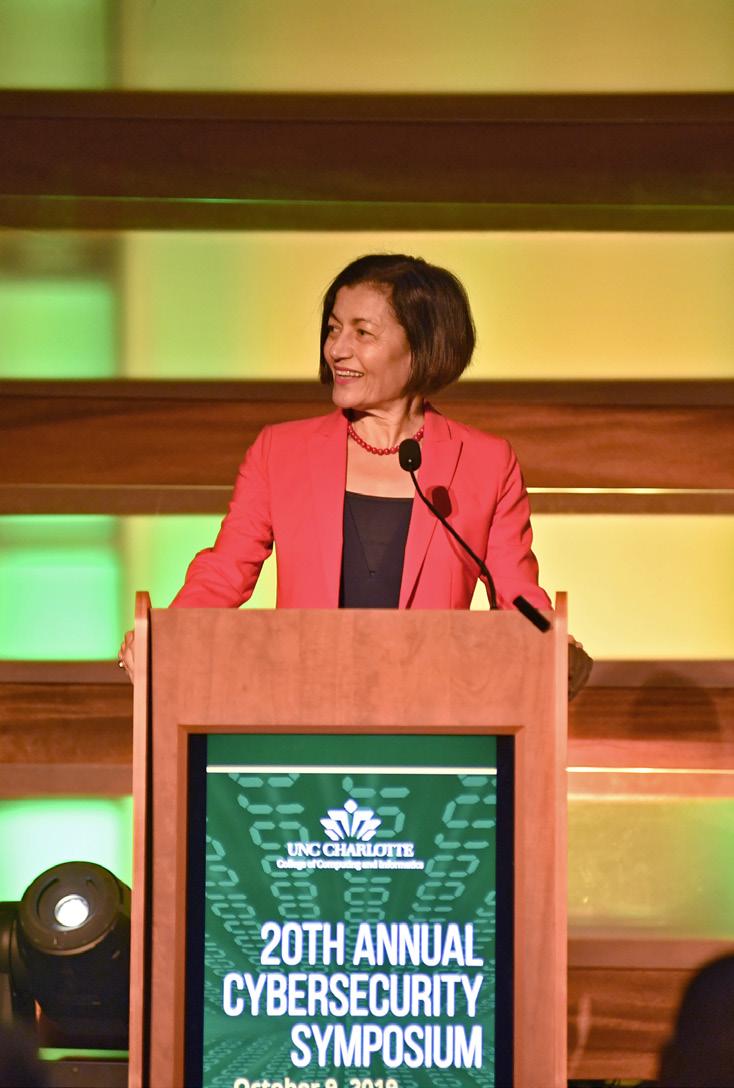
Kat Lawrence
we must address the ethical and social implications of the things we design, produce and integrate with, and maintain.
What is on the horizon for CCI at UNC Charlotte? CCI will continue to strive to be the best college it can be for every student and member of our faculty and staff. This is who CCI is—and it cannot be driven by concerns for external metrics and perceptions.
Brighthouse Scholarship recipient Barbara Saboe recently transferred to UNC Charlotte from Central Piedmont Community College. Her goal—after earning a degree in cybersecurity—is entrepreneurship.

Scholarships help deserving CCI students secure a bright future
Kat Lawrence
BY JENNIFER HOWE
Driven by a mission to help people achieve financial security, Brighthouse Financial expressed a desire to support undergraduate students from the College of Computing and Informatics at UNC Charlotte. Working with college administrators, the Charlottebased corporation made a generous gift to EXPONENTIAL: The Campaign for UNC Charlotte to create the Brighthouse Financial Student Scholars program.
“The Brighthouse Financial Foundation is pleased to support a scholarship fund to help recruit and retain underserved students in the College of Computing and Informatics at UNC Charlotte,” said Brighthouse Financial Foundation President Theresa Foust. “The scholarship fund aligns with our mission to provide support and resources to historically underserved populations, and allows deserving students the opportunity to not only continue their education but achieve lifelong dreams. We are honored to help ease the financial burden so the students can focus on accomplishing their goals.”
The renewable scholarships, awarded for the first time in fall 2019, are given to select students who meet specific eligibility requirements. Candidates must be undergraduate students majoring in computer science, from the Charlotte area, and have both a demonstrated financial need and a history of academic excellence. Preference is given to students from populations historically underrepresented at UNC Charlotte. As part of their scholarship agreements, scholarship recipients participate in regional outreach activities, such as high school recruitment events, to help promote the computer science program and the University.
The Brighthouse Financial scholarships awarded last fall already are making an impact on the lives of their recipients.
Steps toward entrepreneurship
Barbara Saboe could not have completed her first semester successfully at UNC Charlotte without the Brighthouse Financial Scholarship. The mother of three was faced with having to choose between paying for rent and insurance or buying school supplies for her children, ages 14, 12 and 6.
“The Brighthouse Financial Scholarship came just in time to save me from having to make that difficult decision,” said Saboe.
Pao Xiong realized early that an education was the path to a successful future – for him and his family. Focusing on software development, Xiong aims to use computer science to achieve his dreams and help others.
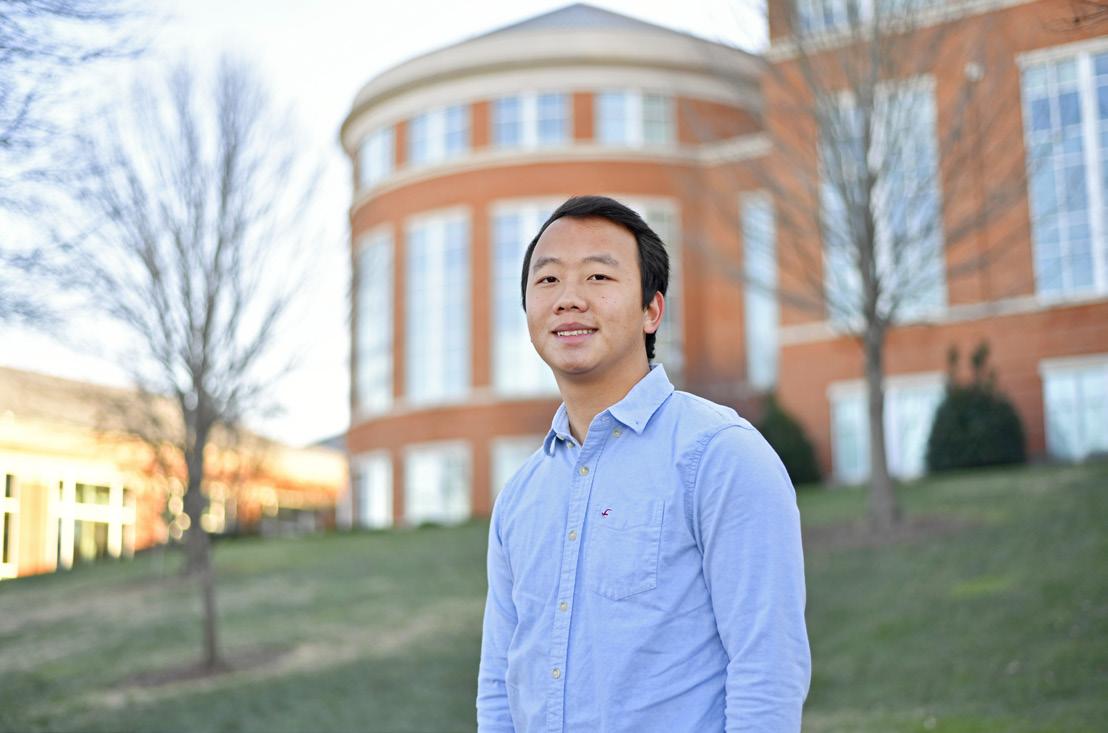
Kat Lawrence
A single mom and full-time inside sales representative with Brown and Morrison, Ltd, Saboe transferred to UNC Charlotte after completing an associate degree at Central Piedmont Community College in 2018.
“The associate degree is helpful on my resume, but it wasn’t going to get me where I need to be financially,” Saboe said. “I knew that to get anywhere, I’d have to complete a bachelor’s degree, ideally at a significant and renowned school.”
A former resident and board member of Catherine’s House, a transitional shelter for women and children who are homeless, Saboe aspires to pursue a career in cybersecurity and use her experience overcoming obstacles to start her own company.
“I want very much to make a difference and help other struggling single mothers, just as so many have helped me,” she said. “No one gets to where they are going alone.”
Motivated to succeed
Pao Xiong also possesses a drive to succeed. Xiong spent the first five years of his life in a refugee camp in Thailand with his parents, displaced during the Vietnam War from Laos, and his 10 siblings. He suffered from malnutrition and a lack of educational opportunities, but always had hope. When his family was able to relocate to the United States, Xiong started attending school.
“I was well aware that education was going to be my way out of poverty, and the only way to eventually provide for my hardworking parents,” said Xiong. “This caused me to excel academically, achieving straight As from fourth grade until I graduated as valedictorian of West Mecklenburg High School in 2019.”
He arrived at UNC Charlotte last fall, ready to start his freshman year with 32 college credits: 18 through Advanced Placement courses and 14 through dual enrollment in early college at Central Piedmont Community College. As a Brighthouse Financial scholar, Xiong is able to focus completely focus on his education, which includes a concentration in software development.
“Being a Brighthouse Financial Scholar has blessed me with the opportunity to have more time to dig deep into code and the resources to open countless possibilities for myself and others,” said Xiong. “I want to use the field of computer science as a way to carry out my dreams and aid those who are unable to live their dreams due to uncontrollable factors.”
Barbara Saboe and Pao Xiong are two of five inaugural Brighthouse Financial Scholars. For more information about the scholarship or to apply, visit ninercentral.uncc.edu.
At a news conference at UNC Charlotte Center City, Derek Wang ‘11, Ph.D., founder of Stratifyd, one of Charlotte’s fastest-growing tech firms, announced the AI leader will open space in the FreeMoreWest neighborhood and add 200 jobs. Ryan Honeyman
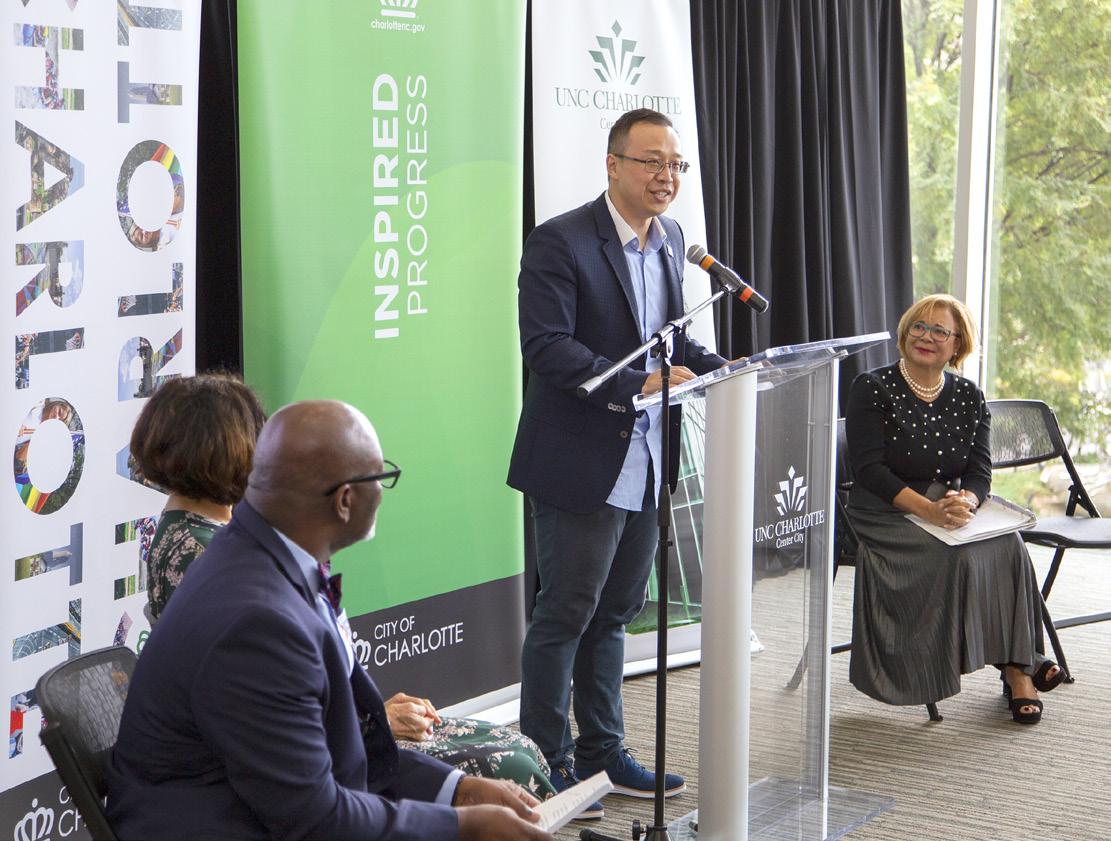
ANALYZING ALUMNI SUCCESS: The Data on Derek Wang
BY JONNELLE DAVIS U NC Charlotte, originally a landing pad for Beijing native Derek Chang ‘11, Ph.D., recently served as a launching pad for his new venture. A computer science doctoral student who later joined the College of Computing and Informatics (CCI) as a member of the faculty, Wang has transformed into a celebrated entrepreneur who started his data analytics firm, Stratifyd, using what he learned from his UNC Charlotte experience.
Now, Wang is looking to help other students in the field to find their footing. He announced late last year that Stratifyd will add at least 200 jobs and relocate to a 30,000-square-foot facility in Charlotte’s FreeMoreWest neighborhood. Wang started the artificial intelligence (AI) powered customer data analytics company in 2015 with two students, Li Yu ’12 Ph.D., and Thomas Kraft, as government-funded research on ways artificial intelligence might ingest, analyze and visualize structured and unstructured data. They applied their post-doctoral work in this area to build Stratifyd.
Today, Stratifyd provides customer analytics to companies around the world using the AI platform, giving businesses important data they can use to adapt their marketing techniques, improve their services and increase revenue.
Straight answers from Derek Wang
Why is UNC Charlotte special to you?
Wang applied to doctoral programs in 2005 and received offers from institutions along the east and west coasts; his offer letter from UNC Charlotte arrived while at home in Beijing, China. Excited but a little confused about Charlotte’s location, he and his father searched Wikipedia for the answer. Today, Wang is comfortable in a city once unfamiliar to him, and works from an office near uptown Charlotte, where he runs Stratifyd.
“Charlotte was my first landing pad in the United States. And that’s special to any person when they start a new journey, especially across the continents to look into a new world. So it’s almost like home for me.”
From your perspective as a former CCI professor, how does the college prepare students for real-world experiences?
Wang recalled working with his advisor, the late Bill Ribarsky and CCI’s former dean, Yi Deng, at the time they started crafting programs around data science and business analytics.
“We started thinking about the upcoming needs of the workforce, where there exists a horizontal understanding of multidisciplinary knowledge. With the long-term vision—starting about 7 years ago—of our chancellor, deans, and department chairs, both from CCI and the Belk School of Business, UNC Charlotte has been preparing students for the future workforce in an effective way. That work is coming to fruition given the student growth rate as well as the programs that have been deployed.”
How is UNC Charlotte making an impact?
Addressing questions from colleagues outside the Southeast about the presence of a regional “talent drought,” Wang tells them UNC Charlotte and the College of Computing and Informatics have eliminated that concern.
“I’m proud to say, ‘No,’ to whether there is a need for qualified computing professionals because of UNC Charlotte’s student body of nearly 30,000. That’s a huge advantage for a community in terms of talent, especially technology talent. UNC Charlotte— along with other nearby colleges and universities—plays an important role in making a positive impact on the workforce, not just in the city, but truly across the region.”
At what point in your career did you know you wanted to start your own business?
Wang regards the work he did as a doctoral student at UNC Charlotte as a “solid step forward” in his aspirations to become an entrepreneur, particularly with CCI’s supportive professors who encouraged students to be innovative.
“My journey to start a company was inspired by writing grant proposals and working with Department of Homeland Security and Department of Defense—as well as learning through different faculty members to convert research ideas into deliverables for our commercial partners to leverage. And that’s a true inspiration for me, to discover, ‘Hey, I have a great kind of drive and motivation to do something outside the academic setting.’”

What advice would you give students who are just starting their journey at UNC Charlotte?
Wang doesn’t give general advice to students because they come from various backgrounds, and have different career paths and personalities. But he does encourage undergraduate and graduate students to take ownership of everything they do — and be very disciplined.
“Echoing the slogan of the Carolina Panthers, keep pounding. That’s actually a lifestyle. And I see where it benefited me as a doctoral student. Just keep at that. Keep working hard. But fit that into your own background and journey.”

In general, do people understand what artificial intelligence is?
Wang acknowledges the negative connotation surrounding artificial intelligence because of the perception that it might eliminate jobs. The point, he says, is to make sure AI sounds human, because it’s really about humans leveraging a tool.

“It’s about delivering something tangible that you can put your hands on. Frankly, that’s what makes what we’re doing a human business. We help you be more efficient.”
To learn more about Derek Wang and Stratifyd, visit stratifyd.com.






